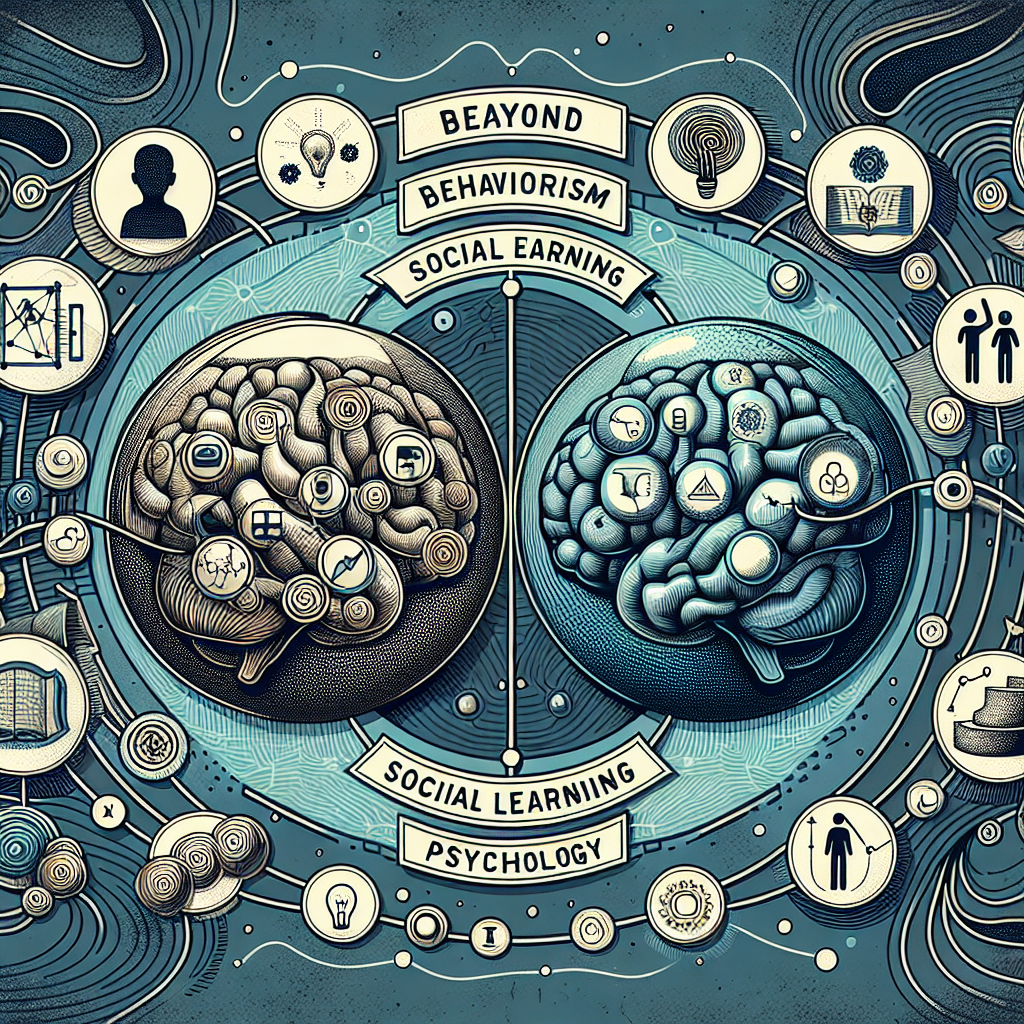
Beyond Behaviorism: Integrating Social Learning into Contemporary Psychology for Ultimate Understanding
Introduction
In the ever-evolving landscape of psychology, the need to merge traditional theories with modern insights is more pressing than ever. As we explore the depths of human behavior, the phrase "Beyond Behaviorism: Integrating Social Learning into Contemporary Psychology" encapsulates a critical juncture in our understanding. While behaviorism once dominated the field with its focus on observable actions, the integration of social learning theory has given rise to a more nuanced perspective that addresses the complexities of human experience. This article takes you on a journey through the intricacies of these theories, examining their applications, effectiveness, and the profound impact they hold in today’s world.
The Historical Foundations of Behaviorism
Behaviorism emerged in the early 20th century, spearheaded by figures such as John B. Watson and B.F. Skinner. Their focus on observable behaviors, rather than internal states like thoughts and emotions, laid a foundational stone for psychology as a scientific discipline. Skewed by tangible data, behaviorism emphasized learning through conditioning—both classical and operant. However, while behaviorism provided a roadmap for understanding learning processes, it lacked an in-depth exploration of the social contexts that shape human behavior. The question then arises: how can we move beyond behaviorism and encompass the social dimensions that interplay with our actions?
The Advent and Evolution of Social Learning Theory
Enter Albert Bandura, the acclaimed psychologist whose work expanded the boundaries of behavioral theories through his revolutionary social learning theory. Bandura argued that people learn not only through their experiences but also by observing others, making imitation an essential component of the learning process. This fundamental shift laid the groundwork for a more holistic approach to understanding psychology, extending beyond mere behaviors and entering the realm of cognitive and social dynamics.
Bandura’s famous Bobo Doll experiment illustrated how children learn aggressive behaviors by simply observing adults interact with the doll, reinforcing the significance of social context in understanding behavior. This landmark study solidified the importance of observational learning, paving the way for integrating social learning into contemporary psychology.
Case Study: The Bobo Doll Experiment
In 1961, Bandura conducted a pivotal study with preschool children exposed to adults behaving aggressively towards a Bobo doll. The children who observed aggressive adults were more likely to display similar behaviors, validating the core tenet of social learning. This experiment exemplifies how the environment plays a crucial role in shaping behavior, reinforcing the idea that learning extends beyond direct experiences and includes social influences.
Analysis
The Bobo doll experiment serves as a powerful reminder of the necessity to integrate social learning into contemporary psychological practices. As we aim to understand behavior, it becomes evident that dismissing the role of observation and social interaction limits our comprehension of developmental and behavioral cues.
Interdisciplinary Integration: Merging Behaviorism and Social Learning
The integration of social learning into contemporary psychology requires a systematic understanding of how to blend these approaches seamlessly. While behaviorism remains a valuable tool for examining actions, social learning theory invites us to consider the internal cognitive processes, motives, and social nuances that contribute to behavior.
Table: Key Differences Between Behaviorism and Social Learning Theory
| Aspect | Behaviorism | Social Learning Theory |
|---|---|---|
| Focus | Observable behaviors | Observational learning, internal cognitive processes |
| Learning Mechanism | Conditioning | Imitation, modeling, social context |
| Environment’s Role | Direct reinforcement and punishment | Vicarious reinforcement through observing others |
| Cognitive Processes | Minimal emphasis on internal thoughts | Significant focus on thoughts, beliefs, and perceptions |
| Examples | Pavlov’s dogs, Skinner’s operant conditioning | Bandura’s Bobo doll experiment |
The Role of Cognitive Processes
Integrating social learning into contemporary psychology highlights the significance of cognitive processes. Thought patterns, self-efficacy, and social dynamics are essential elements influencing our behaviors. By assessing how these elements interact with observable actions, psychologists can develop more effective therapeutic techniques and interventions.
Practical Applications of Social Learning in Contemporary Psychology
The applicability of social learning theory extends across various fields, including education, therapy, and public health. Methods derived from this integrated perspective enrich our understanding of human interaction and behavioral change.
Education
In the classroom, teachers can leverage social learning principles to enhance student engagement and collaboration. For instance, when students observe their peers successfully solving problems, they gain confidence in their abilities, mirroring Bandura’s emphasis on vicarious learning.
Example: Peer Tutoring Programs
Peer tutoring programs exemplify the success of social learning in education. When students work together, they not only reinforce their knowledge but also learn from observing their classmates’ problem-solving strategies. This collaborative approach fosters a supportive learning environment that encourages growth.
Therapy
In therapeutic settings, integrating social learning theory can transform approaches to mental health. Cognitive-behavioral therapy (CBT), for instance, is founded on the principles of both behaviorism and social learning—the understanding that observing others in therapeutic situations may positively influence a client’s behavior and thought patterns.
Case Study: CBT in Action
A study involving individuals with social anxiety demonstrated the effectiveness of CBT by observing others overcoming their fears. Participants who engaged in group therapy, learning from others’ experiences, reported lower anxiety levels and improved social skills, highlighting the profound impact of social learning in therapy.
Public Health Campaigns
Social learning theory also plays a vital role in public health initiatives. Campaigns promoting healthy behaviors—like smoking cessation or healthy eating—can benefit from strategies that model positive behaviors through influential figures or social networks.
Table: Effective Public Health Strategies Using Social Learning
| Health Behavior | Modeling Strategy | Outcome |
|---|---|---|
| Smoking Cessation | Featuring ex-smokers in campaigns to demonstrate success | Increased motivation and success rates in quitting |
| Nutrition Awareness | Celebrity chefs promoting healthy cooking | Higher engagement and lifestyle changes towards better eating |
| Exercise Adoption | Community fitness groups showcasing transformations | Greater participation and adherence in fitness programs |
Evaluating the Importance of Integration
"Beyond Behaviorism: Integrating Social Learning into Contemporary Psychology" is more than a phrase; it represents a guiding principle for current and future practitioners. By evaluating how these theories can coalesce, we cultivate an understanding that is well-rounded, empathetic, and efficacious.
Social learning reminds us that people are not isolated beings acting on reinforcements alone; they are social creatures influenced by the world around them. The complexities of individual experience and the interdependence of societal systems require a multifaceted approach to psychology.
Real-World Implications
As we integrate social learning into psychology, professionals can yield significant improvements in various fields. Consider mental health treatment, educational reforms, or public health strategies: the implications are vast.
Conclusion
The journey "Beyond Behaviorism: Integrating Social Learning into Contemporary Psychology" illustrates the rich tapestry of human behavior intertwined with social influence and personal cognition. The fusion of these theories not only elevates our understanding of psychological principles but also enhances its practical applications.
As you reflect on your own experiences, think about how social observations have shaped your behaviors. Remember, every interaction, every learned action, emerges not just from our own experiences but from a deep network of observation and social context. If we commit to embracing an integrated approach, not only do we enhance our understanding of psychology, but we also enrich lives—creating a ripple of positive influence in society.
FAQ Section
1. What is behaviorism, and how does it differ from social learning theory?
Behaviorism focuses on observable actions and emphasizes learning through conditioning and reinforcement. In contrast, social learning theory integrates cognitive processes, proposing that individuals learn through observation and imitation of others.
2. How can educators apply social learning theory in their classrooms?
Educators can implement peer tutoring, group projects, or collaborative learning, allowing students to observe and learn from one another, thereby enhancing engagement and retention of information.
3. What role does modeling play in social learning theory?
Modeling is central to social learning theory; it posits that individuals acquire behaviors by observing others’ actions and the outcomes of those actions, thereby influencing their choices and behaviors.
4. How can social learning inform therapeutic practices?
Therapeutic practices can employ social learning by showcasing client success stories, promoting group therapy sessions, where individuals learn from each other’s experiences, and reinforcing positive behaviors within a supportive community.
5. Why is it crucial to combine behaviorism and social learning in psychology?
Combining behaviorism and social learning offers a more comprehensive understanding of human behavior, allowing practitioners to consider both observable actions and the social and cognitive processes that underlie them, ultimately leading to more effective interventions.
By embracing the insights gathered from this exploration, we can collectively move towards a future where the intricacies of human behavior are understood not just through singular lenses but through the rich interplay of social contexts and individual experiences. The journey is as significant as the destination, and in psychology, every step taken towards a holistic understanding enriches both the field and the lives we touch.













